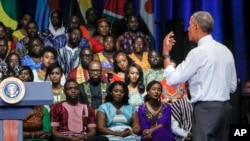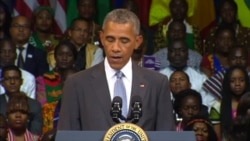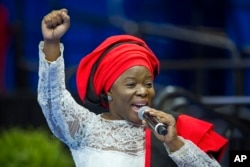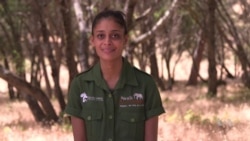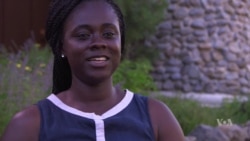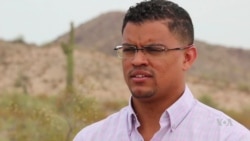On the eve of President Barack Obama’s 55th birthday, he was greeted in song with "Happy Birthday" Wednesday by about a thousand participants at this year’s Young African Leaders summit in Washington.
Obama launched the Young African Leaders Initiative (YALI) six years ago to support an emerging generation of young African entrepreneurs, activists and public officials. Its flagship program, the Mandela Washington Fellowship, began two years ago with the goal of empowering young Africans through academic coursework, leadership training and networking.
"Today's Africa is a place of unprecedented prosperity and opportunities," Obama told the excited crowd, noting that he'd visited sub-Saharan Africa four times, more than any other U.S. president.
WATCH: Obama Speaks About His African Heritage at YALI Town Hall
During his time as president, Obama said, "I've worked to transform America's relationship with Africa by working to boost exports with Africa, promote good governance and human rights, advance security and help feed families.
"We've done this not just because we love the people of Africa. ... It’s because the world won’t be able to deal with climate change or terrorism or expanding women’s rights — all the issues we face globally — without a rising and dynamic and self-reliant Africa. And that, more importantly than anything else, is dependent on a rising generation of new leaders.”
Both sides learning
The president said the U.S. partnership with Africa is a two-way street: “For all the experiences you are gaining here in America, we are learning from you. We are energized by your passion and learning from your perspectives. And this year, for the first time, Americans traveled to Africa to visit Mandela fellows in their home communities, so that Americans can learn about community building and more from Africans.”
More than 40,000 people applied to join the Mandela Washington Fellowship program this year. It was the largest number yet, more than double the size of previous years.
The three-day summit, which began Monday, featured a congressional forum, an expo with more than 100 organizations engaged in Africa, and Wednesday's town-hall meeting with Obama.
The president announced new support from the Millenium Challenge Corporation, the U.S.-African Development Foundation and the Citi Foundation to provide Africans with grants and professional opportunities.
Starting next summer, African youth can gain technical and leadership skills through a new MCC program for interns, "Africa’s Promise," supporting large-scale development projects that make up MCC-funded compact programs. The youth will learn the best practices on project management — including financial and public sector management — in the local country context.
“For Africa to reach its full potential, it will need experienced public sector leaders who can write the next chapter in Africa’s story,” MCC Chief Executive Officer Dana J. Hyde said.
Obama takes questions
Questions at the town hall touched on sanctions in Sudan, conflicts in the Democratic Republic of the Congo, leaders' accountability in their public life, and Obama's plans to continue the initiatives he’s developed after he leaves office. He also was asked what issues he faced during his time in office were the toughest.
“I’ve had my share of tough issues,” he told fellows at the young leaders summit. "The issue that had the greatest magnitude was the issue I faced when I first came into office, and that was that the world economy was in the midst of an unprecedented financial crisis that was then spilling over into the broader economy."
Obama said daily sources of frustration for him have been the inability to stop world conflicts, such as in Syria and South Sudan, and the challenge of terrorism.
He addressed with a smile the ups and downs of the U.S. election year, saying, “You’ve also gotten a front-row seat for the fascinating, roller-coaster process of American democracy, being here during election season. I hope you’ve buckled your seat belts.”
“Democracy is hard everywhere," Obama said, "even in the world’s oldest continuous democracy. It’s always challenging and it’s always messy. But as you watch our elections, I want you to know that one of the things that leaders in Washington agree on — both sides of the political aisle — is the importance of a strong American partnership with the nations and the people of Africa.”
Six weeks in U.S. universities
The young African leaders convened in Washington after six weeks of academic study and leadership training at nearly 40 institutions of higher education across the United States. Participants had a chance to sharpen their skills through coursework and professional development in business and entrepreneurship, civic leadership or public management.
WATCH: YALI Conservationist Targets Poaching of Animals
Raabia Hawa was part of the YALI program at the University of California-Berkeley. A conservationist from Kenya whose passion for elephants began when she was just a child, she’s now a part of Walk with Rangers, working to fend off poachers throughout North America.
“Prior to coming to the University of California-Berkeley, I started seeking out wildlife rescue centers," Hawa told VOA. " ... I feel empowered with the knowledge that I’ve gained ... from all the different places I’ve visited, and the different methods of caring for animals that I’ve experienced and participated in.”
Passionate about solar energy
Another of the young African fellows, Adele Boadzo, a South African electrical engineer, has a different passion. As founder of the energy nonprofit Hope Rises Solar, she is driven by her grandmother’s memory in the quest to bring solar electricity to Africa. Boadzo spent her summer at the University of California-Davis’ Energy Institute.
WATCH: Memory of Grandmother Drives Founder of Energy Nonprofit
“My paternal grandmother lived in rural Ghana; she was a community leader in her village," Boadzo said. "One day she was cooking, using a gas stove, and came back and lit a match. ... She burned and died in the hospital a few days later.” That inspired the young engineer to start her company.
The fellowship has had a profound effect, Boadzo said, “in the sense that I don’t feel like I’m alone in this battle, in this struggle. There are 24 other fellows who have the same vision.”
As part of the first class of energy fellows, she visited the university’s solar farm and Tahoe Environmental Research Center.
“We were able to get the technology to actually measure carbon sequestration ... which is important in the South African context, especially because ... 85 percent of our electricity [is] generated from fossil fuel, which means we’re number 16, or in the top 20, in terms of carbon emissions in the world,” she said.
YALI
Through YALI, the Obama administration says it has invested significant resources to enhance leadership skills, promote entrepreneurship, and connect young African leaders with one another and with Americans.
WATCH: Mandela Fellow's Goal Is to Improve Aviation Safety in Africa
The State Department said that since 2010, it has held 15 exchange programs for young African leaders, and sponsored more than 1,600 sub-Saharan students and scholars through its educational and cultural affairs programs. U.S. embassies have also awarded 80 small grants totaling $1.25 million to YALI alumni groups supporting youth development in Africa.
Some have questioned the program's underlying goals — to teach career skills or to mold Africa's future leaders. Leah Nyambeki Owuor, a Kenyan who spent six weeks at Massachusetts’ Bridgewater State University with 25 other fellows, said YALI is one way to create empowerment, so it’s not all about political leadership.




